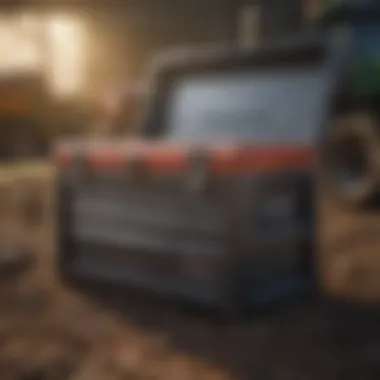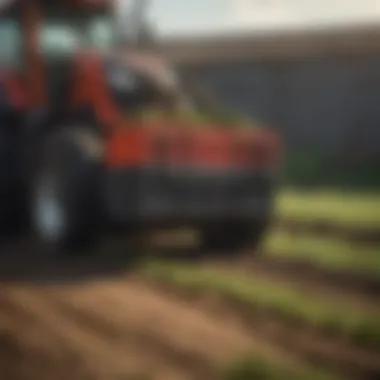Exploring Agriculture's Essential Field Service Tool Boxes


Intro
Field service tool boxes play a pivotal role in agriculture, serving as essential components for effective field operations. These tool boxes are designed to withstand the rigors of outdoor environments, where durability and organization are crucial. As the agricultural sector evolves, professionals and enthusiasts seek ways to enhance their efficiency in maintaining equipment and managing their work sites. This article will delve into the significant aspects of field service tool boxes tailored for agriculture, shedding light on their various types, innovative features, and maintenance tips.
Current Trends in Agriculture and Horticulture
In modern agriculture, the integration of new technologies and practices is reshaping the landscape. The demand for efficiency has led to advancements in field service tool boxes, as they now incorporate innovative designs and materials that improve usability and longevity.
Overview of Recent Innovations
One of the notable trends is the development of tool boxes with modular designs. These allow farmers to customize their tool storage according to their specific needs. Additionally, manufacturers are increasingly using lightweight and corrosion-resistant materials such as aluminum and high-density polyethylene. These materials not only enhance mobility but also protect tools from harsh weather conditions.
Sustainable Practices Gaining Popularity
Sustainability is becoming a cornerstone of agricultural operations. Many tool box designs now utilize recycled materials or are engineered to be more energy-efficient in their manufacturing processes. This aligns with the broader goal of reducing the environmental impact of farming, reflecting a growing awareness of sustainable practices within the agriculture community.
Essential Farming Techniques
A comprehensive understanding of field service tool boxes also involves recognizing their role in supporting essential farming techniques. The tools carried within these boxes play a vital role in managing various agricultural processes.
Soil Health Management
Proper soil health management is crucial for crop yield. Tool boxes often contain soil testing kits, pH meters, and other instruments essential for assessing soil quality. This information allows farmers to make informed decisions about amendments and fertilization.
Pest and Disease Control Strategies
Effective pest management tools are integral to preserving crop integrity. Field service tool boxes frequently include application equipment for pesticides and fungicides. By having these tools readily accessible, farmers can promptly address pest and disease outbreaks, minimizing crop loss.
Tools and Technology in Farming
The use of technology in agriculture is rapidly advancing. The tools and equipment housed within a field service tool box are instrumental in harnessing these technological innovations.
Overview of Advanced Farming Tools
Modern farming relies heavily on precision agriculture tools. These include GPS-guided equipment, drones for crop monitoring, and soil sensors. Field service tool boxes can help organize and manage these high-tech tools, ensuring they are readily accessible when needed.
Case Studies on the Use of Technology
For instance, a mid-sized dairy farm implemented a drone system to monitor pastures. They organized their drone equipment in a dedicated tool box, which improved operational efficiency and reduced downtime. This is a prime example of how effective tool storage can significantly impact farm productivity.
"The right tools, stored in an effective manner, can enhance not just operational efficacy but also lead to better decision-making in farming practices."
Prelude to Field Service Tool Boxes
Field service tool boxes serve as a cornerstone for effective agricultural operations. They are not just storage units but vital instruments that ensure the readiness and organization of tools needed in the field. The functionality and adaptability of these tool boxes can significantly influence productivity levels and streamline workflow.
Definition and Purpose
A field service tool box can be defined as a portable container designed to hold and organize tools and equipment necessary for maintenance and repair tasks in agriculture. Their primary purpose is to provide easy access to tools, reduce time spent searching for equipment, and ensure that all necessary items are at hand when needed. By having a dedicated space for each tool, users can maintain order and efficiency while conducting repairs or performing routine checks on agricultural machinery and vehicles.
Significance in Agriculture
The significance of field service tool boxes in agriculture cannot be understated. They cater specifically to the demands of agricultural work, where time and resources are often limited. In remote locations, farmers or service personnel might not have immediate access to support facilities. Hence, having a well-equipped tool box can mean the difference between a quick fix and prolonged downtime.


"A well-organized tool box is a farmer's best friend, ensuring every tool is ready when the moment arises."
These tool boxes not only house physical tools but also embody a higher level of preparedness that is essential for maintaining operational efficiency. Additionally, the use of specialized tool boxes can contribute to better project management and successful completion of tasks that rely on precision and care. As agriculture increasingly embraces technology, the evolution of field service tool boxes reflects a broader trend toward enhanced agricultural practices.
In summary, understanding the role of field service tool boxes is essential for anyone involved in the agricultural sector. Their design and functionality cater to the industry's unique demands, ultimately contributing to enhanced productivity and service delivery.
Types of Field Service Tool Boxes
Understanding the different types of field service tool boxes is essential for effective agricultural operations. Each type of tool box serves unique purposes, catering to various needs of farmers, technicians, and agricultural enthusiasts. The selection of the right tool box can enhance efficiency, organization, and accessibility in the field, making tasks smoother and more manageable.
Portable Tool Boxes
Portable tool boxes offer convenience and mobility. These units are designed to be lightweight and easily transportable, allowing users to move their tools and equipment from one location to another with minimal effort. Farmers often use these tool boxes for regular maintenance tasks on their equipment, ensuring they are always prepared for any field operation. The portability feature supports quick response times during critical moments, which can be vital in the agriculture sector.
Some common features include:
- Compact design: Easy to store and carry.
- Built-in handles: Improves carrying ease.
- Organizational compartments: Helps keep tools sorted and easily accessible.
These advantages translate directly into improved operational efficiency in various farming scenarios.
Heavy-Duty Tool Boxes
Heavy-duty tool boxes are built to withstand the rigors of agriculture. Constructed from robust materials, such as steel or high-quality plastics, these tool boxes provide durability in harsh working environments. Their design focuses on high capacity, enabling them to accommodate large tools and equipment.
Key features include:
- Reinforced construction: Enhances resistance to physical damage.
- Weatherproofing: Protects contents from rain and moisture.
- Security features: Often include locks for safeguarding valuable tools.
These attributes make heavy-duty tool boxes ideal for farmers who work in tough conditions and require reliable storage for heavy machinery and tools.
Modular Tool Box Systems
Modular tool box systems represent an innovative approach in tool storage solutions. These systems consist of interlocking units that can be customized to fit specific needs. Farmers can build their own configurations based on the tools they commonly use, providing both flexibility and organization.
Highlights of modular tool box systems include:
- Customizable setups: Adapt the structure as needs evolve.
- Easy expansion: Add additional modules as required.
- Integrated organization: Keeps different types of tools organized and easily accessible.
Such flexibility is crucial for users who want a storage solution that can grow with their operations.
"The choice of tool box significantly impacts both productivity and satisfaction in field operations. Selecting the right type can lead to enhanced efficiencies."
In summary, the various types of field service tool boxes each serve vital functions that enhance agricultural performance. Recognizing individual requirements and aligning them with the right tool box type can help optimize work processes in the field.
Key Features of Field Service Tool Boxes
Field service tool boxes play a vital role in ensuring that agricultural professionals can operate with maximum efficiency. The design and features of these boxes directly impact usability and, ultimately, productivity in the field. Understanding the key features of field service tool boxes allows farmers and enthusiasts to make informed decisions that enhance their day-to-day operations.
Durable Materials
Durability is paramount when selecting a field service tool box. These tools experience harsh conditions, from extreme weather to rough handling. Generally, materials such as steel or heavy-duty plastics are preferred because they offer the resilience needed for outdoor use.
Metal tool boxes often resist dents and rust, which is crucial for long-term usability. Lightweight options, on the other hand, provide ease of transport but may not withstand intensive use. An ideal box might blend materials to achieve both durability and portability.
Organization Systems
An effective organization system is essential for the optimal functioning of field service tool boxes. Without proper organization, even the most advanced tools can become inaccessible or lost, leading to wasted time and frustration. Various compartments, trays, and specialized slots help to categorize tools efficiently.
Some tool boxes feature removable organizers that allow users to customize their layout based on specific tasks. Additionally, clear labeling systems can aid quick identification, which is particularly beneficial in high-pressure situations. Overall, organization protects investments and ensures that tools are readily available when needed.


Mobility Solutions
In agriculture, mobility can be a deciding factor in productivity. Tool boxes should not only be easy to carry but also designed for ease of access in the field. Solutions such as wheels or handles make transportation less strenuous. Some advanced models come equipped with all-terrain wheels, allowing them to navigate rough terrains, which is often encountered in farming sectors.
Moreover, a compact design may enable users to fit tool boxes into various vehicles, maximizing space efficiency. The right mobility solutions mean that a farmer can have tools within reach at all times, ultimately streamlining operations and increasing overall productivity.
Technological Integration in Tool Boxes
In recent years, the integration of technology in field service tool boxes has become increasingly important for agricultural professionals. The use of innovative technologies not only enhances the functionality of these tool boxes but also improves efficiency in various field operations. This section will delve into the significance of technological integration, with a focus on smart tool boxes and tracking systems.
Smart Tool Boxes
Smart tool boxes are equipped with advanced features that go beyond traditional designs. These tools offer integrated connectivity options, allowing users to sync their devices for better organization and management. For instance, certain models may connect to mobile applications that help keep track of equipment usage, user access, and inventory levels. This facilitates more efficient management of essential tools needed in agricultural settings.
Moreover, smart tool boxes often feature built-in sensors and alarms. These alerts notify users of factors like temperature changes or potential equipment failures, allowing for proactive maintenance. The data collected from these sensors can lead to informed decisions about repairs and replacements, minimizing downtime in critical operations.
Key benefits of smart tool boxes include:
- Increased efficiency through organized access to tools.
- Reduced operational costs via data-driven maintenance strategies.
- Enhanced security through monitoring and alarms.
Tracking Systems
Tracking systems are another crucial technology in field service tool boxes. These systems enable users to monitor the location and usage of tools in real time. With GPS integration, farmers can easily locate their tools, which is vital when working across large agricultural sites.
Furthermore, tracking systems help mitigate the risk of theft or loss. By knowing where tools are at all times, users can account for their inventory more effectively. This is particularly important in expensive agricultural equipment that can represent a significant investment.
Additionally, data from tracking systems can provide insights into usage patterns. This information allows for better planning and allocation of resources. For example, understanding which tools are frequently used can inform purchasing decisions, ensuring users have the necessary equipment available whenever required.
To summarize, the technological integration within tool boxes is reshaping the agricultural field. Smart tool boxes and effective tracking systems enhance productivity and streamline operations. Investing in these advanced solutions not only addresses current operational challenges but also prepares agricultural professionals for future demands in the industry.
"Investing in smart tool boxes and tracking systems provides farmers with the tools to enhance their productivity and efficiency."
This shift towards technology is a noteworthy trend that agricultural professionals must consider as they seek to optimize their field service requirements.
Choosing the Right Field Service Tool Box
Selecting the right field service tool box is crucial in the agricultural sector. It can significantly affect operational efficiency, ensuring that essential tools and equipment are readily accessible. A mismatched tool box can lead to disorganization, wasted time, and ultimately, increased costs. Therefore, understanding individual needs and budget considerations becomes key components in making an informed decision. In this section, we will examine how to assess specific needs and the impact of budget in the selection process.
Assessing Individual Needs
Identifying individual needs is the first step in choosing a field service tool box. Different farming activities require a variety of tools. A farmer focused on crop production may need a different tool box compared to one who maintains heavy machinery. It is important to evaluate the specific tools that are essential for tasks at hand.
- Tool Type and Size: Consider what types of tools will be stored. Larger tools or multiple smaller tools will influence the size and layout of the tool box.
- Mobility Needs: Depending on the type of farming operation, mobility may be a priority. Some farmers may require a portable design for easy transportation across fields.
- Environment Considerations: The environment in which the tool box will be used plays a role. Exposure to weather elements may necessitate a weatherproof tool box made from durable materials.
Overall, assessing personal requirements involves examining the daily duties a farmer performs and determining the specific configurations that will improve productivity.
Budget Considerations
Budgeting is an integral aspect when choosing a field service tool box. The options available in the market range significantly in price, which can impact the selection process. A few aspects are worth considering:
- Initial Investment: It is vital to establish a budget before exploring options. A high-quality tool box may present a higher initial cost but could result in long-term savings due to durability and efficiency.
- Maintenance Costs: Factor in ongoing maintenance. Some tool boxes require more upkeep and repairs, which can elevate costs over time.
- Value for Money: Sometimes, a lower-priced option may not offer the features or durability needed, leading to the necessity of replacement sooner than expected.
"Budget properly, and you might find that investing slightly more now leads to greater savings later."
Ultimately, the balance between need and budget will guide farmers toward the tool box that enhances their workflow without compromising financial stability. The right choice in a field service tool box can amplify productivity, while miscalculating either needs or budget can hinder progress significantly.


Maintenance and Care for Tool Boxes
Maintaining field service tool boxes is vital for several reasons. Proper care extends the lifespan of the tools and ensures they perform optimally when needed. Besides, regular maintenance can prevent costly repairs and replacements. In agriculture, where downtime translates to financial loss, ensuring tool boxes are well cared for can significantly improve efficiency in field operations.
Routine upkeep focuses on cleaning and inspection. Both aspects help identify potential issues before they escalate. Therefore, it is not merely about aesthetics; it directly impacts performance and usability.
Regular Cleaning Practices
Regular cleaning of tool boxes is essential to prevent grime build-up, which can contaminate tools and affect their function. Farmers should establish a cleaning routine that involves removing tools and wiping down the interiors and exteriors of tool boxes.
Key cleaning practices include:
- Using a mild detergent: Avoid harsh chemicals that may damage the materials.
- Wiping with a soft cloth: This prevents scratching the surface.
- Checking for rust: Clean with a wire brush if rust appears, then apply a rust inhibitor.
- Organizing tools: After cleaning, put tools back in an organized manner, as this will save time in the future.
Inspection Protocols
Inspection protocols are a critical part of maintaining tool boxes. A regular examination helps identify wear and tear that could lead to malfunction. Farmers should implement a systematic approach to inspections, making sure to check key aspects of the tool box regularly.
Important inspection items include:
- Hinges and locks: Ensure they are functioning smoothly, as these components are often subject to wear.
- Interior conditions: Look for signs of moisture or corrosion inside the box, which could affect tools stored within.
- Structure integrity: Inspect for any cracks or structural weaknesses, particularly after heavy use or transport.
- Labeling: Ensure that tools are labeled correctly and easily retrievable, reducing time spent searching during fieldwork.
"A well-maintained tool box is a farmer's best ally in the field, ensuring that every necessary tool is readily available and in working order."
By integrating these maintenance practices, farmers not only protect their investment but also streamline their work processes. Engaging in regular cleaning and inspections fosters a proactive approach to equipment management, necessary for success in the agriculture sector.
Future Trends in Field Service Tool Box Design
The field of agriculture continually evolves, and so do the tools and equipment used in the industry. Understanding the future trends in field service tool box design is crucial for agricultural professionals. These trends not only reflect advancements in technology but also the growing emphasis on sustainability and user-friendliness. By adapting to these changes, farmers and technicians can enhance their operational efficiency and efficacy.
Sustainability in Materials
As environmental concerns grow, the demand for sustainability in product design is ever more urgent. Field service tool boxes are increasingly being made from recycled materials or renewable resources. This shift serves multiple purposes. It reduces waste and minimizes the carbon footprint associated with manufacturing new materials.
Farmers are now more inclined to choose products that are eco-friendly. For instance, companies like Husky and DEWALT focus on creating tool boxes using high-strength recycled plastics. These materials can withstand harsh outdoor conditions, ensuring durability without compromising environmental values.
Moreover, sustainable design often leads to greater resilience. Tool boxes are less likely to require replacement, providing long-term cost savings. When selecting a tool box, consider how the materials align with your values and environmental goals. It is a small yet significant step toward a more sustainable agricultural industry.
Enhanced Automation Features
Automation is transforming various sectors, and field service tool boxes are no exception. The integration of technology into tool boxes enhances their functionality and usability. Smart tool boxes equipped with automated features allow for improved management of tools and resources.
For example, some new designs incorporate tracking systems that can monitor tool usage and inventory levels. Such features enable users to keep track of what tools are available and where they are located. Consequently, this minimizes downtime that occurs from searching for misplaced equipment.
Another significant aspect of automation is the integration of digital interfaces. Tool boxes may soon include apps that provide maintenance reminders or troubleshooting tips based on the specific tools housed within. Milwaukee has led innovations in this area, offering tools that connect with mobile devices, improving user experience.
Closure: The Evolving Role of Tool Boxes in Agriculture
Field service tool boxes have become indispensable in the realm of agriculture. As farming practices evolve with the demands of modern society, the tool boxes supporting these operations must also adapt. The conclusion of this article emphasizes the various aspects of tool boxes that contribute significantly to agricultural efficiency and productivity.
One key element involves technological advancements. Today's tool boxes are increasingly integrating smart technology that supports farmers in monitoring tools and equipment effectively. Features like mobile app connectivity allow for easy access to tool inventories and usage data. This not only saves time but also enhances organization, ensuring that farmers can locate the necessary tools when they are required.
"In 2023, smart tool boxes have shifted from being mere storage units to vital instruments participating in digital farming ecosystems."
The benefits of modular designs also deserve attention. By allowing customization and adaptability, modular tool boxes cater to the wide-ranging needs of agricultural operations. Custom fittings enable farmers to arrange their tools and equipment based on frequency of use, making field tasks smoother and more efficient.
Furthermore, sustainability is becoming a vital consideration in tool box design. Many manufacturers are now focusing on eco-friendly materials that reduce environmental impact without compromising durability. This shift not only meets market demands but also aligns with the growing awareness of sustainable farming practices.
When discussing public perception and expectations, it becomes clear that farmers today seek tool boxes that not only serve their basic functions but also assist in the overall management of their agricultural tasks. Thus, smart features, ergonomic designs, and sustainable materials are gaining importance in consumer choices.
As we reflect on the evolving role of tool boxes in agriculture, it's essential to consider how these tools can influence productivity, organization, and sustainability. The future may see even greater innovations as technology continues to shape agricultural practices. Evaluating tool boxes in this light offers valuable insights into how they can help meet the challenges faced by modern farmers.



